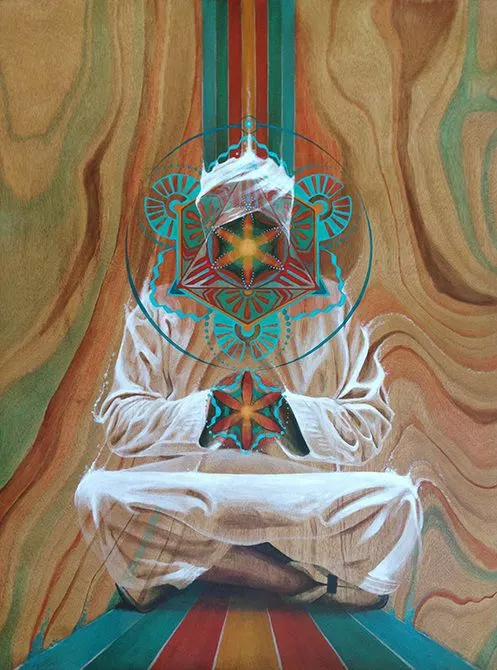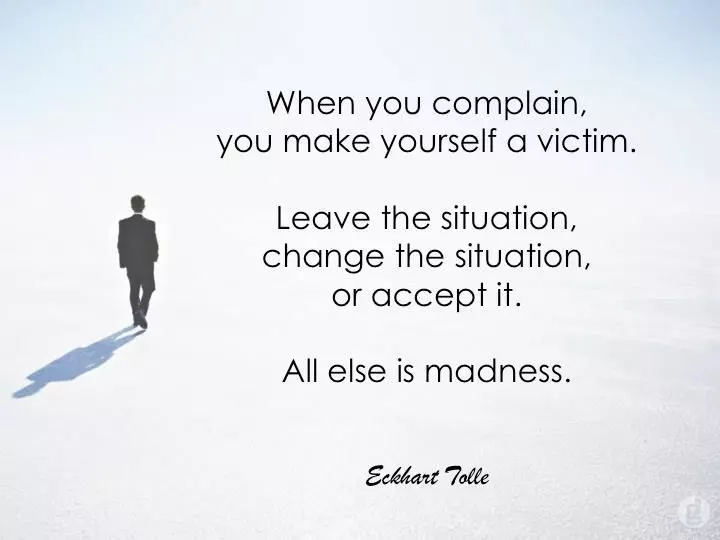“Don’t bend; don’t water it down; don’t try to make it logical; don’t edit your own soul according to the fashion. Rather, follow your most intense obsessions mercilessly.” ~ Franz Kafka
Listen! You have from this moment until the day you die to live the life you want to live; to do exactly what it is you love, whatever that is.
But some people don’t know themselves well enough to know what they love. Sometimes a spiritual journey is needed. Sometimes a leap of courage is just what the witch-doctor ordered.

Ask yourself: Am I okay with living a life without a spiritual journey? If the answer is yes, then by all means stop reading, bury yourself in a single, one-right-way doctrine, lean on it like a crutch, and just become religious. It’s the easier path (just remember: you can’t kickstart a dead horse).
If, however, the answer is no, then read on and imagine yourself as the creator of your own journey, and become authentically spiritual. It’s exceedingly more difficult, but definitely more rewarding. There will be giants whose shoulders you can stand on, like Jesus, Buddha and Nietzsche. There will even be crutches to lean on from time to time. Just remember, crutches have always had more utility in dust, lest we become lazy and move through life as a spiritual cripple.
Sometimes you’ll discover the voice box of God and be able to sound it like a bullhorn from your own throat chakra. Sometimes your voice will be meek and the words of others will be needed to compel you to sing. Sometimes, often, the spiritual path begins where the religious one ends.
Either way, the point of a spiritual journey is to discover yourself discovering yourself. Once you begin, it never really ends. But you have to begin in order to feel how the journey is the thing. But beginning a new journey can sometimes be daunting and scary, especially a spiritual one.
Our comfort zones can only stretch so far before we snap. So here are seven ways to marinate our comfort zones so they are more elastic and flexible for the arduous spiritual journey ahead.
1) Listen intently for the call to adventure
“What is it we are questing for? It is the fulfillment of that which is potential in each of us. Questing for it is not an ego trip; it is an adventure to bring into fulfillment your gift to the world, which is yourself. There is nothing you can do that’s more important than being fulfilled. You become a sign, you become a signal, transparent to transcendence; in this way you will find, live, become a realization of your own personal myth.” ~ Joseph Campbell
 Call to adventure. Beginning initiation. Descent into soul. Transition into heroism. Call it what you will. It’s there, speaking a language that doesn’t use words. So if you want to hear it, you have to be open to hearing it. It can arrive in many ways. It can appear as unfortunate luck or unlucky fortune, or vice versa.
Call to adventure. Beginning initiation. Descent into soul. Transition into heroism. Call it what you will. It’s there, speaking a language that doesn’t use words. So if you want to hear it, you have to be open to hearing it. It can arrive in many ways. It can appear as unfortunate luck or unlucky fortune, or vice versa.
It can come from tripping over success or jumping over defeat. It can come from an earthquake or a thunderstorm or an entheogen. It can come from death, or birth, or both.
There’s no telling when or where it will happen, but when it happens you will know it. The universe lines up like it was designed for you. And it is!
So wherever you go, be the ears of that place. Listen with Over Ears, like as if you are a Cheshire cat perched on a cosmic tree branch listening to all things. Hone your listening skills through meditation in solitude. Sink back into the Source. Listen to silence.
2) Fearlessly embrace fear
“Stop acting so small. You are the universe in ecstatic motion.” ~ Rumi
A funny thing happens when you’re no longer afraid of fear. Your soul opens up. Your ego shrinks into a tool for your soul. Your heart overflows. And suddenly nothing can stop you, because you’re able to use your ego to leverage your soul into the world with proactive intent. You become a force to be reckoned with, the tip of the spear of the spiritual journey.
They say happiness is a choice. Well, it’s the same thing with courage. Courageous people don’t sit around waiting for courage to compel them, they choose to be courageous despite the fear which seeks to cripple them. So if you’re sincere about beginning a spiritual journey, choose courage.
Fear will roll off like water off a ducks back. And even if it doesn’t, your courage will find a way to transform it into even more courage. Proceed as if courage is inevitable and genius will arrive. As Henry Van Dyke said, “Genius is talent set on fire by courage.”
3) Read; read; read
“A mind needs books as a sword needs a whetstone, if it is to keep its edge.” ~ George R.R. Martin
 Keep your mind sharp enough to cut through any and all red tape. Spiritual journeys are not easy. They require an upheaval of the heart, a soul recalibration. One way to be prepared for the worst is to read –a lot. Sometimes it’s the wisdom discovered in a good book that launches a spiritual journey.
Keep your mind sharp enough to cut through any and all red tape. Spiritual journeys are not easy. They require an upheaval of the heart, a soul recalibration. One way to be prepared for the worst is to read –a lot. Sometimes it’s the wisdom discovered in a good book that launches a spiritual journey.
Reading puts the “Thoreau” in being thorough. Words compel us and liberate us. But they can just as easily silence us and imprison us. Which is why we need to read more than just one book. As Rudyard Kipling said, “Words are, of course, the most powerful drug used by mankind.”
But unlike any other drug, the more words the better, because the more ideas we derive from those words, the less likely we are to hang our hats on any single idea. The more likely we are to, as Aristotle said, “entertain a thought without accepting it.”
Diversity is the key with this particular drug of choice. It has launched more spiritual journeys than any other drug known to Man.
4) Travel; travel; travel
“If the philosopher holds aloof, it’s not for reputation’s sake. The fact is that it’s his body that’s in the state, here on a visit, while his thought, disdaining all such things as worthless, takes wings.” ~ Theaetetus
Much travel is needed before the ignorant man matures into a spiritually aware being. Traveling puts life into perspective. It all at once stretches cultural comfort zones, shatters preconceived mental paradigms, and flattens conditioned boxes. The body on the move puts the mind into motion which calibrates the soul to proactively adapt and overcome to any given moment.
Seeking other states, other lives, other ways of leveraging our soul, leads to a profound understanding of impermanence and change. We see, hear, smell, taste, and feel how things are constantly in motion, how there is no such thing as a fixed state. We interdependently crush out.
This leads to a spiritual transcendence of any given state of travel, where each sojourn is merely a link in the chain of the overall journey that compels us to keep moving, to not stagnate or become too comfortable. It is the mark of a well-traveled man to entertain a place without clinging to it.
5) Use pain as a steppingstone
“You might as well be dead. Seriously, if you always put limits on what you can do, physical or anything else, it’ll spread over into the rest of your life. It’ll spread into your work, into your morality, into your entire being. There are no limits. There are plateaus, but you must not stay there, you must go beyond them. If it kills you, it kills you. A man must constantly exceed his level.” ~ Bruce Lee
Use your wounds as a reason to heal. Pain, grief, spiritual angst, these can all be transformed into information that can guide us into a spiritual journey. Instead of wallowing in self-pity or bludgeoning ourselves with whiney, woe-is-me, tiny-ego placation; we can turn the tables on our tiny ego and use it as a tool to leverage some soulcraft into our understanding of the current existential dilemma.
What we discover on the other side of that dynamic is that our tiny-ego blossoms into a robust confidence that our soul can capitalize on by transforming boundaries into horizons, obstacles into reasons to apply newer, more imaginative strategies, and pain into steppingstones that have the potential to launch us into a heightened state of spiritual awareness. This is not to say that we should ignore the pain, or suppress it.
Not at all. In fact, in order to alchemize pain into self-actualization, one must first embrace it, honor it, and let it have its say. But after crying, after the sacred decompression, there’s no reason to wallow in tears. Better to use those tears as fuel for beginning a spiritual journey.
6) Surrender to adventure (in chunks)
“For aren’t you and I gods? Let all of life be an unfettered howl. Release life’s rapture. Everything is blooming. Everything is flying. Everything is screaming. Laughter. Running.” ~ Vladimir Nabokov
Surrender to adventure in small chunks. Don’t overwhelm yourself. Don’t get intimidated by how daunting it all is. Just remember, everything is connected, and the longer you wait between adventures, the less likely you are to gain any real spiritual traction.
You’ll just give yourself more of a reason to toss up walls of fear, or to take the blue pill instead of the red, or you’ll just browbeat yourself with inside-the-box, comfortable and secure reasoning that will keep you from ever pushing your comfort zone to see how far it can stretch before it snaps.
Better to stretch, feel the heat, maybe even get burned a little, then retract, heal the burn, and come out of the experience as a more robust individual with an even bigger comfort zone. Then repeat.
Eventually your comfort zone will be so flexible and so big that you can officially declare yourself on a spiritual journey. Practice surrendering to adventure as much as possible, and before you know it, you’ll be spending more time on adventurous seas than on comfortable shorelines
7) Cherish the moment; remember the journey is the thing
“Mysticism wonders not how the world is but that the world is.” ~ Ludwig Wittgenstein
 Whether or not yours is a spiritual journey you’ve just begun or one that simply grew stale over time, it requires honest and loving engagement with the present moment. Who you are right now is fundamentally different than who you were when your journey began, or even who you were yesterday.
Whether or not yours is a spiritual journey you’ve just begun or one that simply grew stale over time, it requires honest and loving engagement with the present moment. Who you are right now is fundamentally different than who you were when your journey began, or even who you were yesterday.
The journey that launched a billion journeys always begins right now with the you-of-now that is constantly changing from the you-of-yesterday into the you-of-tomorrow. As Barbara Deangelis said, “The journey between what you once were and who you are now becoming is where the dance of life really takes place.” So dance.
Remember to fall in love with the moment. Remember to be awestruck. Don’t forget to be fascinated by the magnanimous grandeur of it all. The journey is the thing, true, but it goes deeper than that –the moment is the thing too.
The here and now is the thing. The infinite present is the thing. All things that have ever, or will ever, mean anything, is contained in this instant that connects to all other instants.
So enjoy it. Revel in it. Be it. Become deep gratitude. Become loving appreciation. Being present to this moment, more than any non-present moment, has the potential to launch a spiritual journey. Indeed. You are the journey, not the destination. And it always begins right Now.
Image source:
Path into cosmos
Jester Jesus
Cloud-head traveler
Covey quote
Mystic bridge
Cameron Gray





 I will always be an introvert. I need my alone time to recharge, think, and reconnect with myself. But, reaching out from the recesses of my alone time to let my partner know when I’ll be home is not compromising myself. It’s actually adding to my higher self, where I try to be aware of other people’s feelings and realities.
I will always be an introvert. I need my alone time to recharge, think, and reconnect with myself. But, reaching out from the recesses of my alone time to let my partner know when I’ll be home is not compromising myself. It’s actually adding to my higher self, where I try to be aware of other people’s feelings and realities.













